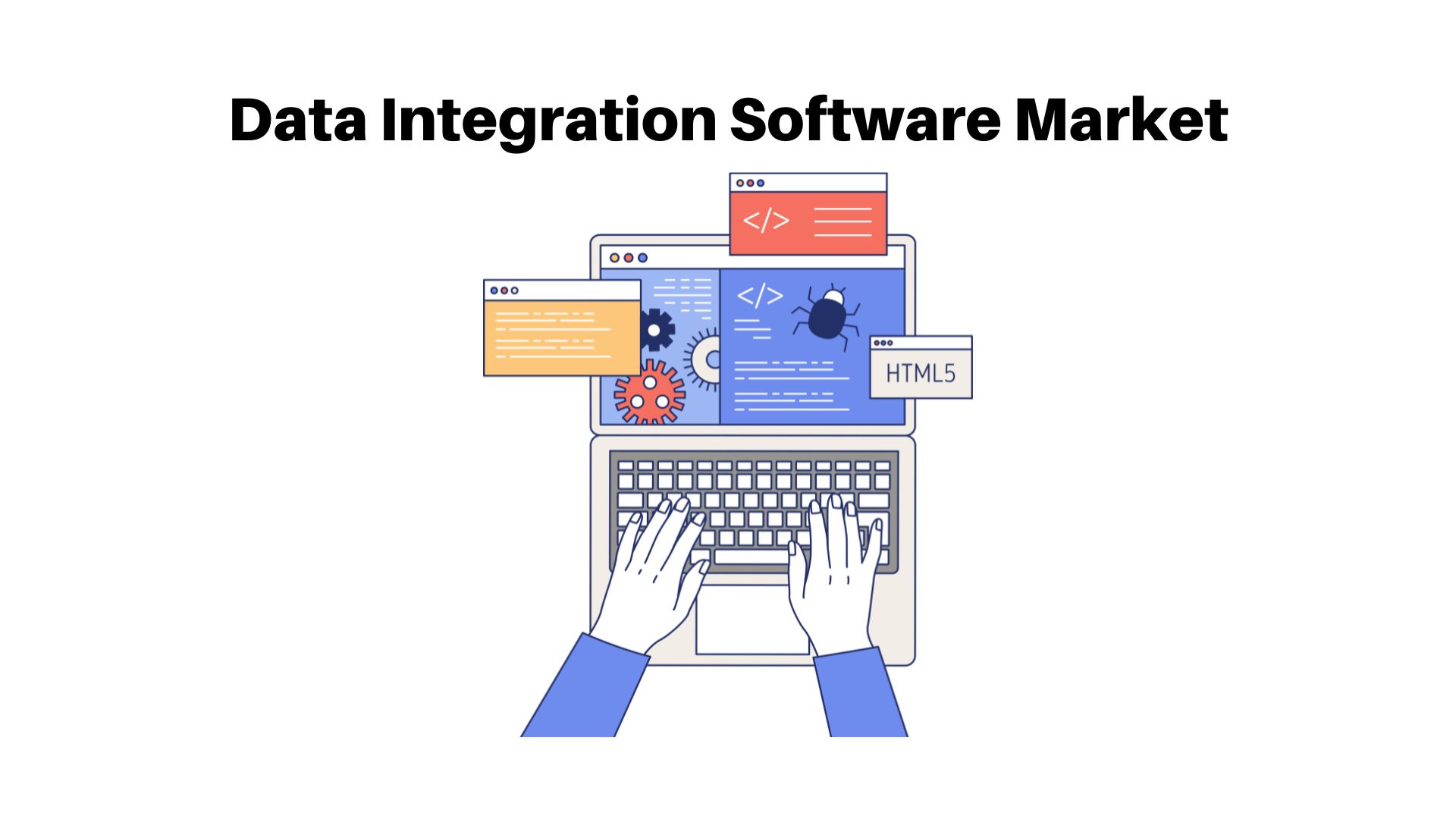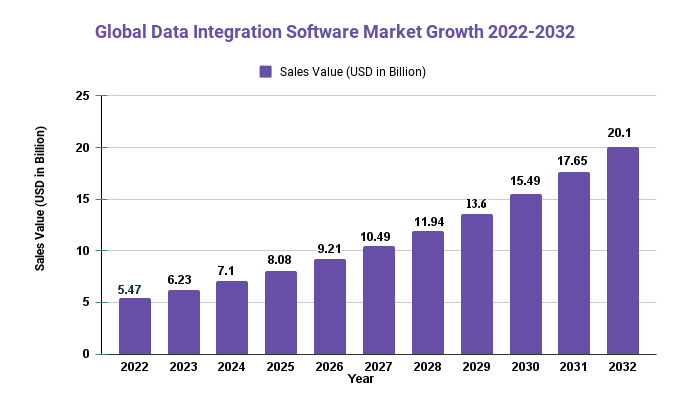Data Integration Software Market: (CAGR 13.9% ) Technical Report + Feasibility Study, 2022-2032

Page Contents
Market Overview
The data integration software market is witnessing a remarkable surge in growth due to the increasing demand for business intelligence, data analytics, and data warehousing solutions. Data integration software helps organizations integrate multiple sources and applications to give end-users a unified view of data that allows them to make informed decisions and enhance performance. Forecasts predict this market will experience an annual compound growth rate (CAGR) of over 13.9% between 2022 and 2032.
The Global Data Integration Software Market size is expected to reach USD 20.10 Bn by 2032, up from its current value of $5.47 Bn in 2022 – growing at a compound annual growth rate (CAGR) of 13.9% from 2022-2032.
The data integration software market is rapidly expanding, offering solutions to integrate data from various sources and formats into a unified view of business information. This demand is being fuelled by organizations' need to manage and analyze large volumes of information from various sources in order to make informed business decisions.
The cloud-based deployment segment is anticipated to hold the largest market share during the forecast period, as organizations increasingly turn towards cloud solutions to cut costs, boost scalability and ensure data security. On-premise deployments are also anticipated to grow steadily due to an ever-increasing need for secure yet highly customizable solutions.
During the forecast period, large enterprises are projected to hold the majority of the market share due to their complex data integration needs and resources for investing in sophisticated solutions. On the other hand, small and medium-sized enterprises (SMEs) are projected to experience faster growth rates as more SMEs adopt data integration solutions to boost operational efficiency.
Geographically, North America is expected to hold the largest market share due to the high adoption of data integration solutions by organizations in this region. On the other hand, Asia-Pacific is projected to experience rapid growth due to SMEs adopting these solutions and an abundance of software vendors in that region.

Request For Sample Report: https://market.us/report/data-integration-software-market/request-sample/
Key Takeaways
The data integration software market is expected to experience substantial growth over the coming years due to increasing demand for business intelligence and data analytics solutions.
Cloud-based data integration solutions are becoming increasingly popular due to their scalability, cost-effectiveness, and adaptability.
The Asia-Pacific region is forecast to experience the highest growth rate during this forecast period due to the increasing adoption of data integration solutions in emerging economies such as China and India.
Major market players include Informatica, IBM, SAP SE, Oracle, Talend, Microsoft, and Cisco Systems as well as Denodo Technologies, Attunity Adeptia Actian Corporation Syncsort Symantec Corporation Teradata Intel.
Regional Snapshot
- North America is expected to dominate the data integration software market due to the presence of major players and the increasing adoption of cloud-based data integration solutions.
- Europe: The European market for data integration solutions is expected to experience rapid growth due to an uptick in demand across various industries such as healthcare, financial services, and retail.
- Asia-Pacific: The Asia-Pacific region is projected to experience the highest growth rate during this forecast period due to the increasing adoption of data integration solutions in emerging economies such as China and India.
- Latin America: The Latin American market is expected to experience significant growth due to the increasing adoption of cloud-based data integration solutions across various industries.
- Middle East & Africa: The MEA region is expected to experience steady growth due to the increasing adoption of data integration solutions in healthcare and government sectors.
Drivers
- Rising demand for business intelligence and data analytics solutions.
- An increase in cloud-based data integration solutions.
- Businesses are placing greater emphasis on digital transformation initiatives.
- Real-time data integration and processing requirements have grown along with data volume and complexity.
Restrictions
- High cost of implementation and upkeep for data integration solutions.
- Absence of skilled professionals in this area.
- Data security and privacy concerns arise due to multiple data sources and applications being utilized simultaneously. With multiple sources and applications come new integration challenges that must be tackled head-on.
Data integration software is a type of program designed to consolidate and manage data from various sources, formats, and types. By using this type of solution, organizations can simplify their data management processes, reduce errors, and make better decisions based on accurate and up-to-date information. In this article, we'll examine the opportunities, challenges, recent developments, and FAQs related to the data integration software market.
Grow your profit margin with Market.us Get this Report
Opportunities
Increased Demand for Cloud-Based Data Integration Software: As cloud computing takes off, many organizations are now searching for cloud-based data integration solutions that offer flexibility, scalability, and cost-effectiveness.
Growth of Big Data: The explosion of data generated by IoT devices, social media platforms, and other sources has created new opportunities for data integration software providers to assist organizations with managing and analyzing large amounts of information.
The emergence of AI and Machine Learning: AI and machine learning technologies are being integrated into data integration software to enhance data processing, analysis, and decision-making capabilities.
Increased Adoption of Self-Service Data Integration Tools: These self-service data integration tools empower nontechnical users to manage and integrate data, empowering organizations to democratize their information and enhance decision-making capabilities.
Challenges
Data security and privacy worries: Integrating sensitive data from multiple sources can pose security and privacy risks, making data integration software providers a major challenge.
Integration of Unstructured Data: Integrating unstructured data such as images, audio, and video files can be challenging due to their inaccessibility; searchable, or standardized in nature.
Data Quality Issues: Data integration software relies on accurate and up-to-date data, but quality issues such as inconsistencies, duplicates, and errors can make integration challenging.
Recent Developments
- Cloud-Based Data Integration Platforms: Cloud-based data integration platforms have become the go-to choice for organizations searching for flexible, scalable, and cost-effective solutions.
- AI and Machine Learning Integration: Data integration software providers are incorporating AI and machine learning technologies to enhance data processing, analysis, and decision-making capabilities.
- Self-Service Data Integration Tools: Self-service data integration tools are becoming more prevalent, giving non-technical users the power to manage and integrate data on their own.
- Low-code data integration platforms: Low-code data integration platforms have emerged as a way to streamline and expedite the data integration process by enabling users to build integrations without writing code.
Key Market Segments
Type
- On-premise
- Hosted
Application
- BSFI
- Government
- E-commerce
- Healthcare
- Others
Key Market Players included in the report
- Informatica
- IBM
- SAP SE
- Oracle
- Talend
- Microsoft
- Cisco Systems
- Denodo Technologies
- Attunity
- Adeptia
- Actian Corporation
- Syncsort
- Symantec Corporation
- Teradata
- Intel
Interested to Procure the Data with Actionable Strategy & Insights? Inquire here at: https://market.us/report/data-integration-software-market/#inquiry
Report Scope
| Report Attribute | Details |
| The market size value in 2022 | USD 5.47 Bn |
| Revenue forecast by 2032 | USD 20.10 Bn |
| Growth Rate | CAGR Of 13.9% |
| Regions Covered | North America, Europe, Asia Pacific, Latin America, and Middle East & Africa, and Rest of the World |
| Historical Years | 2017-2022 |
| Base Year | 2022 |
| Estimated Year | 2023 |
| Short-Term Projection Year | 2028 |
| Long-Term Projected Year | 2032 |
Frequently Asked Questions
Q: What is data integration software?
A: Data integration software is a type of program designed to combine and manage information from various sources, formats, and types.
Q: What are the advantages of data integration software?
A: Data integration software helps organizations streamline their data management processes, reduce errors, and make informed decisions based on accurate and up-to-date information.
Q: What are some challenges associated with data integration software?
A: Some issues encountered when using this type of solution include data security and privacy concerns, the integration of unstructured data, data quality issues, as well as complex integration requirements.
Q: What are some recent advancements in the data integration software market?
A: Recent advancements in the data integration software market include cloud-based platforms, AI/machine learning integration, self-service data integration tools, and low-code platforms.
Q: How can I select the ideal data integration software for my organization?
A: When selecting data integration software, factors like the size and complexity of your data, budget constraints, expertise needed, and scalability/flexibility requirements are important to take into account. Furthermore, security and privacy features must also be evaluated.
The team behind market.us, marketresearch.biz, market.biz and more. Our purpose is to keep our customers ahead of the game with regard to the markets. They may fluctuate up or down, but we will help you to stay ahead of the curve in these market fluctuations. Our consistent growth and ability to deliver in-depth analyses and market insight has engaged genuine market players. They have faith in us to offer the data and information they require to make balanced and decisive marketing decisions.